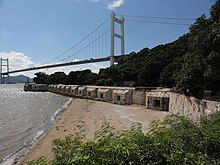Gong Zhenzhou
Gong Zhenzhou 龚 镇洲 | |||||||
|---|---|---|---|---|---|---|---|
| Born | 1882 Hefei, Anhui, Qing China | ||||||
| Died | 29 July 1942[1] Guilin, Guangxi, Republic of China | ||||||
| Other names | Gong Zhenpeng (龚振鵬) | ||||||
| Occupation(s) | Soldier, Revolutionary | ||||||
| Political party | Tongmenghui | ||||||
| Spouse | Xu Wen | ||||||
| Children | Gong Pusheng (daughter) Gong Peng (daughter) Xu Wanqiuc (daughter) | ||||||
| Chinese name | |||||||
| Simplified Chinese | 龚镇洲 | ||||||
| Traditional Chinese | 龔鎮洲 | ||||||
| |||||||
Gong Zhenzhou (龚镇洲) (1882-1942[2]), was a Chinese soldier and revolutionary.[3] He was named Zhenpeng at birth and later used the courtesy name Zhenzhou. A native of Changfeng, Hefei, Anhui, his ancestral home is Linchuan, Jiangxi..[4][5]
Biography
[edit]
In 1906, Gong Zhenzhou was a junior officer serving in the New Army's Ninth Division at Nanjing, and joined the Tongmenghui[6] at the same time as his battalion commander, Bai Wenwei. On November 4, 1911, an uprising broke out in Qingjiang. He was the first person in the Jiangsu and Anhui regions to respond to the Wuchang Uprising. Later, Gong Zhenzhou served as the commander of the Second Brigade of Bai Wenwei's Revolutionary First Army. During the Second Revolution in 1913, Gong Zhenzhou served as commander of the Second Army and led his troops to regain Wuhu. After its failure, he was proscribed and fled to Japan. On returning to China in 1917, he joined Sun Yat-sen's military government in Guangzhou[7] and served as the commander of Humen Fort.[3][8]

When the Constitutional Protection Movement collapsed, Gong withdrew to Shanghai with his family, in far from well-off circumstances[2] and ran an apartment block. He became increasingly sympathetic to anti-Chiang activities, after the April 12 Incident. Following the Shanghai Incident in 1932, Gong traveled to Beijing with his friend Zhang Taiyan and urged Zhang Xueliang to send troops to save the country. After that, Gong Zhenzhou traveled between Sichuan, Yunnan, and Guangxi, calling for resistance against Japan. Later, Zhou Enlai, head of the Chinese Communist Party delegation in Chongqing, hosted a banquet for Gong Zhenzhou in Chongqing. In July 1942, Gong Zhenzhou fell ill and died in Guilin.[1] Zhou Enlai, Dong Biwu, and Deng Yingchao jointly sent a message of condolences: "Mr. Zhenzhou, a man of virtue and talent, who made great contributions to the Republic of China. ... We are deeply saddened by the sudden death!" At that time, Gong Zhenzhou's second daughter Gong Peng was assisting Zhou Enlai.[3]
Family
[edit]Gong married Xu Wen, a cousin of the revolutionary Xu Zonghan, who was the second-wife of Huang Xing.[8] The couple had three daughters: Gong Pusheng, Gong Peng and Xu Wanqiuc.
References
[edit]- ^ a b Mei Xingwu (March 27, 2019). "外交战线上的"姐妹花"". people.com.cn. China Communist Party News Network. Archived from the original on September 9, 2023. Retrieved March 25, 2024.
- ^ a b "Gong Pusheng—Revolutionary and Diplomat Extraordinaire". Women of China. All China Women's Association. September 25, 2010. Archived from the original on May 10, 2017. Retrieved March 24, 2024.
- ^ a b c "龚镇洲,中国合肥,2011年05月16日". Archived from the original on July 19, 2013. Retrieved May 17, 2013.
- ^ "馆藏家谱—龚". Archived from the original on March 27, 2012. Retrieved April 13, 2019.
- ^ "四牌楼走出的国务总理:稻香村、逍遥津是他的私产,一生只对日本说"不"". Archived from the original on June 8, 2019. Retrieved April 13, 2019.
- ^ Lee, Lily Xiao Hong (July 8, 2016). Biographical Dictionary of Chinese Women: v. 2: Twentieth Century. Oxon: Routledge. p. 179. ISBN 978-1-315-49924-6. Retrieved May 10, 2022.
- ^ Lee 2016, p. 180.
- ^ a b "新中国首批驻外女大使之一龚普生逝世,财经网" ["Gong Pusheng, one of the first female ambassadors of New China to foreign countries, passed away"] (in Chinese). August 31, 2007. Archived from the original on March 4, 2016. Retrieved May 17, 2013.
